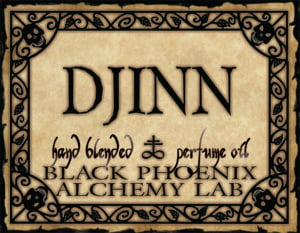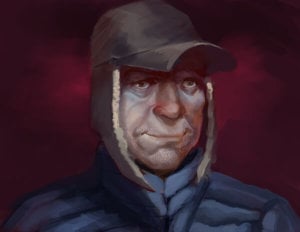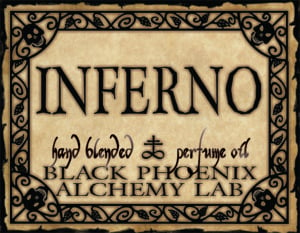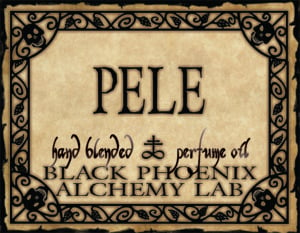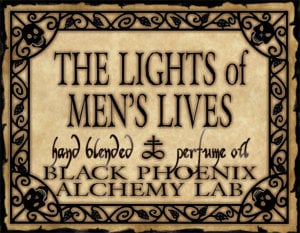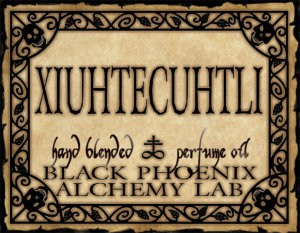Element - Fire
-
Djinn Perfume Oil
Select OptionsAn ancient, free-willed race created from the essence of Fire, much as man was created from Earth. They prowled the land at night, vanishing with the first rays of dawn. Myths surrounding the Djinn paint them as many things: benevolent champions of mankind and slaves to mad sorcerers, malicious incubi / succubi and energy vampires, or malevolent harbingers of madness and disease. The Djinn are ruled by Iblis, the Prince of Darkness, who bears unspeakable contempt for man.
The scent of black smoke, of crackling flames, and smoldering ashes.
-
Hinzelmann Perfume Oil
Add to cartWhere Hinzelmann had been standing stood a male child, no more than five years old. His hair was dark brown, and long. He was perfectly naked, save for a worn leather band around his neck. He was pierced with two swords, one of them going through his chest, the other entering at his shoulder, with the point coming out beneath the rib-cage. Blood flowed through the wounds without stopping and ran down the child’s body to pool and puddle on the floor. The swords looked unimaginably old.
The little boy stared up at Shadow with eyes that held only pain.
And Shadow thought to himself, of course. That’s as good a way as any other of making a tribal god. He did not have to be told. He knew.
You take a baby and you bring it up in the darkness, letting it see no one, touch no one, and you feed it well as the years pass, feed it better than any of the village’s other children, and then, five winters on, when the night is at its longest, you drag the terrified child out of its hut and into the circle of bonfires, and you pierce it with blades of iron and of bronze. Then you smoke the small body over charcoal fires until it is properly dried, and you wrap it in furs and carry it with you from encampment to encampment, deep in the Black Forest, sacrificing animals and children to it, making it the luck of the tribe. When, eventually, the thing falls apart from age, you place its fragile bones in a box, and you worship the box; until one day the bones are scattered and forgotten, and the tribes who worshipped the child-god of the box are long gone; and the child-god, the luck of the village, will be barely remembered, save as a ghost or a brownie: a kobold.
Shadow wondered which of the people who had come to northern Wisconsin 150 years ago, a woodcutter, perhaps, or a mapmaker, had crossed the Atlantic with Hinzelmann living in his head.
And then the bloody child was gone, and the blood, and there was only an old man with a fluff of white hair and a goblin smile, his sweater-sleeves still soaked from putting Shadow into the bath that had saved his life.
The luck of the tribe: black pine pitch and gouts of blood, darkness and bonfires that cast long shadows.
-
Inferno Perfume Oil
Select OptionsThe Dark Side of Fire: cinnamon, bitter almond, and neroli. Heavily spiced, torrid, and possibly conflagrant.
-
Pele Perfume Oil
Select OptionsWhimsical, temperamental, radiant and ravishingly beautiful Goddess of Volcanoes, Fire, Lightning and Dance. She is the Mother of Eruptions and the personification of destructive power. Volcanic eruptions are said to be a side-effect of her jealous rages and her epic quarrels with her siblings are legendary. This perfume embodies her gentler, benign aspect as the capricious Goddess of Dance: muguet and Hawaiian white ginger enveloped by warm, damp tropical blooms.
-
The Lights of Men’s Lives Perfume Oil
Select OptionsWhen Death saw that for a second time he was defrauded of his own property, he walked up to the physician with long strides, and said, “All is over with thee, and now the lot falls on thee,” and seized him so firmly with his ice-cold hand, that he could not resist, and led him into a cave below the earth. There he saw how thousands and thousands of candles were burning in countless rows, some large, others half-sized, others small. Every instant some were extinguished, and others again burnt up, so that the flames seemed to leap hither and thither in perpetual change. “See,” said Death, “these are the lights of men’s lives. The large ones belong to children, the half-sized ones to married people in their prime, the little ones belong to old people; but children and young folks likewise have often only a tiny candle.” “Show me the light of my life,” said the physician, and he thought that it would be still very tall. Death pointed to a little end which was just threatening to go out, and said, “Behold, it is there.”
The wax and smoke of millions upon millions of candles illuminating the walls of Death’s shadowy cave: some tall, straight, and strong, blazing with the fire of life, others dim and guttering.
-
Xiuhtecuhtli Perfume Oil
Select OptionsPatron of the Aztec pantheon, he is the personification of light within darkness, warmth in the cold, and life in, and after, death. He is a creative and destructive God of Fire and Light, and is appeased only by sacrifice, trial, and the slaughter of his people’s enemies. Copal, plumeria and sweet orange and the smoke of South American incense and crushed jungle blooms.
